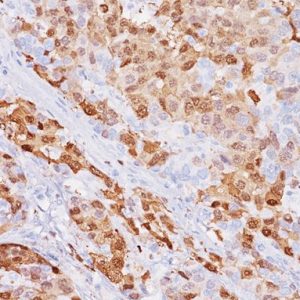Description
The progesterone receptor is a member of the steroid-receptor family. Steroid hormones bind to intracellular receptors and these receptors can bind to DNA and regulate gene expression directly. Research has shown PR to reflect intact estrogen regulatory machinery and predicts a higher response to endocrine therapy than ER alone. A study has implicated the loss of Progesterone Receptor [PgR636] antibody expression as an independent predictor of poor prognosis and lymph node metastasis in endometrial carcinomas.
SPECIFICATIONS
Specifications
| WEIGHT | N/A |
|---|---|
| DIMENSIONS | N/A |
| INTENDED USE | ASR |
| SPECIES REACTIVITY | Human |
| SOURCE | Mouse Monoclonal |
| CLONE | PgR636 |
| ISOTYPE | IgG1/kappa |
| ANTIGEN | Progesterone Receptor |
| LOCALIZATION | Nuclear |
| POSITIVE CONTROL | Breast cancer |
DATASHEETS & SDS
OUS ONLY IVD
REFERENCES
1. Press M, Spaulding B, Groshen S, Kaminsky D, Hagerty M, Sherman L, Christensen K, Edwards DP. Comparison of different antibodies for detection of progesterone receptor in breast cancer steroids. Steroids. 2002 Aug; 67(9):799-813.
2. Center for Disease Control Manual. Guide: Safety Management, NO. CDC-22, Atlanta, GA. April 30, 1976 “Decontamination of Laboratory Sink Drains to Remove Azide Salts.”
3. National Committee for Clinical Laboratory Standards (NCCLS). Protection of laboratory workers from infectious diseases transmitted by blood and tissue; proposed guideline. Villanova, PA 1991; 7(9). Order code M29-P.







Reviews
There are no reviews yet.